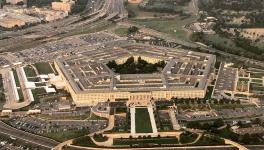Thousands march in Caracas in support of Bolivarian Revolution, Maduro
Speaking the massive rally, president Nicolas Maduro thanked the people for their love and support to the Bolivarian Revolution. Photo: Resumen Latinamericano
On February 2, thousands of citizens and members of social movements and people’s organizations took part in a massive rally and marched to the Bolivar Avenue in Caracas, Venezuela, in support of the Bolivarian Revolution, president Nicolás Maduro and national sovereignty in face of intensified US aggression. They were commemorating 20 years of the swearing-in of Commander Hugo Chavez as the president of Venezuela. The march was called for by the United Socialist Party of Venezuela (PSUV). The massive rally was especially significant in the light of western media claiming that Maduro had lost the support of the people.
President Maduro addressed the people and thanked them for their continuous love and support to the Bolivarian Revolution. “Long live people’s power”, said Maduro, urging the people to continue fighting for their sovereignty. “People have demonstrated, during these #20YearsInBattleAndVictory, a deep loyalty and infinite love for the Bolivarian Revolution, that fills us with strength to continue on the path of Commander Chavez. Thank you so much of love!”, Maduro tweeted after the rally. “I congratulate the noble and heroic people of Venezuela for their determination to defend the national sovereignty. This #2Feb, the Bolivar Avenue of our indomitable Caracas, was filled with happiness, patriotism and an overwhelming support to the Bolivarian Revolution. Here nobody gives up!”, he wrote in another tweet.
On February 2, 1999, Hugo Chavez assumed the presidency after winning the elections of December 6, 1998, with 56.54% of the votes. His arrival meant the end of the Fourth Republic, a time marked by social inequality, neoliberal economic policies and abuse of power, and the beginning of the Bolivarian Revolution, a process of political, economic, social and cultural transformation of Venezuela.
The rally took place even as the country’s right-wing, backed by the US administration, EU and conservative Latin American governments of the Lima Group, seeks once again to roll back the achievements of these 20 years of Chavismo. On January 23, Juan Guaidó, a member of the Venezuelan National Assembly, arbitrarily declared himself interim president of Venezuela. The US and its allies immediately declared their support to him. Earlier, on January 21, a coup attempt by a group soldiers of the Bolivarian National Guard was prevented by the Bolivarian Armed Forces of Venezuela. Last year, on August 4, an attempt was made to assassinate Maduro using drones loaded with explosives.
In the aftermath of Guaido’s coup attempt, on January 29, in order to increase pressure on the Venezuelan government, the US administration announced new brutal sanctions and said that it would block 7 billion dollars in assets of the Venezuelan state oil company, Petroleos De Venezuela SA (PDVSA), and 11 billion dollars of their export revenue. In response,Maduro announced a series of legal actions to achieve compensation for the damage.
The US interventionist actions have been condemned internationally. A number of social movements and social organisations across the globe and the governments of China, Russia, Turkey, India and Caribbean countries have announced their support for Maduro. The National Bolivarian Armed Forces have declared their support for the legitimate president. Recently, during an event, more than 17,000 Evangelical and Pentecostal churches of Venezuela gave their absolute support to president Nicolas Maduro.
Maduro reiterated his willingness to engage in dialogue and thanked Mexico, Uruguay and Bolivia for their efforts. “I ratify my support for the initiative of Mexico, Uruguay and Bolivia for the dialogue and solving problems among Venezuelans,” he said. On January 31, the governments of Uruguay and Mexico declared their position in favor of peaceful dialogue in Venezuela and convened an international conference which will be held on February 7 in Montevideo.
“We want to give a message to imperialism, that there are people who will defend the homeland, freedom and independence”, said Jessica Asprilla, an activist associated with the Movement of Pioneers, one of the participating organisations.
Get the latest reports & analysis with people's perspective on Protests, movements & deep analytical videos, discussions of the current affairs in your Telegram app. Subscribe to NewsClick's Telegram channel & get Real-Time updates on stories, as they get published on our website.
























